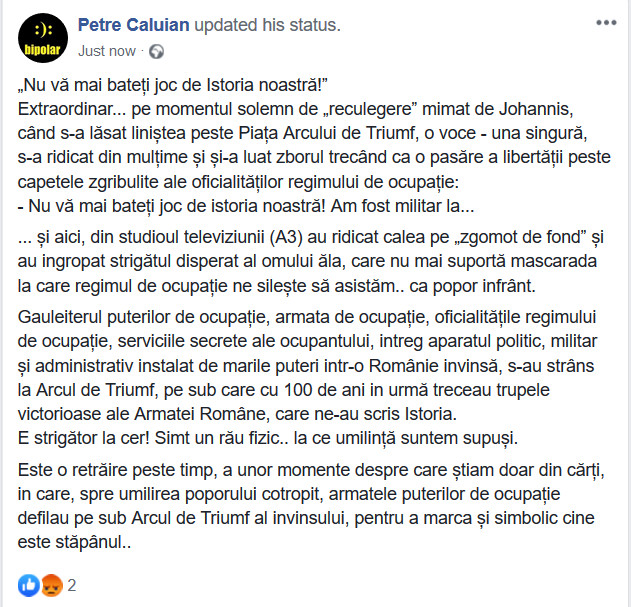Un articol potrivit la ziare.com. (memorare) Didactic.
Iacă și pe amicul PP. (memorare)
Ultima găselniță pentru proști: “Sunt român, de ce rămân?”.
Stați la locurili voastre: nu s-a întâmplat nimica…

1. During the preceding Cold War with the Soviet Union, no attempt was made to “isolate” Russia abroad; instead, the goal was to “contain” it within its “bloc” of Eastern European nations and compete with it in what was called the “Third World.”
2. The notion of “isolating” a country of Russia’s size, Eurasian location, resources, and long history as a great power is vainglorious folly. It reflects the paucity and poverty of foreign thinking in Washington in recent decades, not the least in the US Congress and mainstream media.
3. Consider the actual results. Russia is hardly isolated. Since 2014, Moscow has arguably been the most active diplomatic capital of all great powers today. It has forged expanding military, political, or economic partnerships with, for example, China, Iran, Turkey, Syria, Saudi Arabia, India, and several other East Asian nations, even, despite EU sanctions, with several European governments. Still more, Moscow is the architect and prime convener of three important peace negotiations under way today: those involving Syria, Serbia-Kosovo, and even Afghanistan. Put differently, can any other national leaders in the 21st century match the diplomatic records of Russian President Vladimir Putin or of his foreign minister, Sergei Lavrov? Certainly not former US presidents George W. Bush or Obama or soon-to-depart German Chancellor Angela Merkel. Nor any British or French leader.
4. Much is made of Putin’s purportedly malign “nationalism” in this regard. But this is an uninformed or hypocritical explanation. Consider French President Emmanuel Macron, who recently reproached Trump for his declared nationalism. The same Macron who has sought to suggest (rather implausibly) that he is a second coming of Charles de Gaulle, who himself was a great and professed nationalist leader of the 20th century, from his resistance to the Nazi occupation and founding of the Fifth Republic to his refusal to put the French military under NATO command. Nationalism, that is, by whatever name, has long been a major political force in most countries, whether in liberal enlightened or reactionary right-wing forms. Russia and the United States are not exceptions.
5. Putin’s success in restoring Russia’s role in world affairs is usually ascribed to his “aggressive” policies, but it is better understood as a realization of what is characterized in Moscow as the “philosophy of Russian foreign policy” since Putin became leader in 2000. It has three professed tenets. The first goal of foreign policy is to protect Russia’s “sovereignty,” which is said to have been lost in the disastrous post-Soviet 1990s. The second is a kind of Russia-first nationalism or patriotism: to enhance the well-being of the citizens of the Russian Federation. The third is ecumenical: to partner with any government that wants to partner with Russia. This “philosophy” is, of course, non- or un-Soviet, which was heavily ideological, at least in its professed ideology and goals.
6. Considering Washington’s inability to “isolate Russia,” considering Russia’s diplomatic successes in recent years, and considering the bitter fruits of US militarized and regime-change foreign policies (which long predate President Trump), perhaps it’s time for Washington to learn from Moscow rather than demand that Moscow conform to Washington’s thinking about—and behavior in—world affairs. If not, Washington is more likely to continue to isolate itself.
